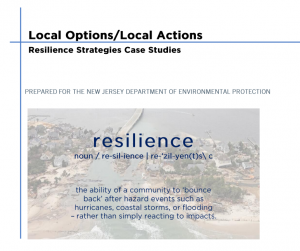Local Options/Local Actions Resilience Strategies Case Studies
 New Jersey’s coastal communities are already experiencing the impacts of rising seas, erosion, and coastal storms, including property damage, loss of property value, and declines in municipal tax revenues. These 239 coastal communities are home to over 4.6 million people, which represents more than 52 percent of the state’s total population. Action is needed to protect these towns and the people who call them home. But what kind of action?
New Jersey’s coastal communities are already experiencing the impacts of rising seas, erosion, and coastal storms, including property damage, loss of property value, and declines in municipal tax revenues. These 239 coastal communities are home to over 4.6 million people, which represents more than 52 percent of the state’s total population. Action is needed to protect these towns and the people who call them home. But what kind of action?
New Jersey Future analyzed 350 innovative strategies applied in 76 cities or regions that could serve as model initiatives to develop the 15 strategies detailed in the Local Options/Local Actions: Resilience Strategies Case Studies report for the New Jersey Department of Environmental Protection (NJDEP).
The strategies are organized into six categories–planning, regulatory, ecological, economic, social, and communications/outreach/education–to provide an accessible and comprehensive menu of options for local officials. No single strategy will yield resilience, and climate risks will fluctuate over time. For this reason, the report recommends local officials consider combinations of strategies tailored for their communities while preparing to pivot to new strategies as risks evolve and risk levels change.
Confronting climate risks can be uncomfortable for local officials and residents to address, but failing to do so will only perpetuate the flood-rebuild-flood practice that puts people and property back in harm’s way without considering future risks. This report can act as a starting point for these discussions and guide towns toward a path of resilient development, fostering safe, healthy, and prosperous communities for generations to come.











